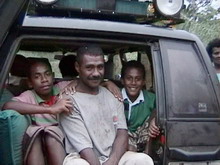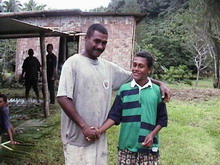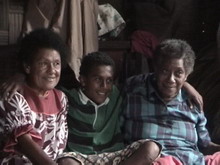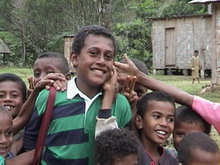
Joe is a wonderful Fijian boy who lives in a seaside village of about 200 people.
One day, Joe surprised me by saying, "I don’t know my father, never met him."
This surprised me because I thought I knew his real father, a man named Sosi, and I asked him about that.
"Yes," he explained, "Sosi is my love father who married my mother, but another man was the first father, the blood father. And I have never seen him."
He told me he believed the man lived in a distant village called Tonga Viti, many hours drive into the interior of the rain forest. I offered that when Joe turned 18 or 21, or whenever, I’d be glad to try to help go to the village to find the man.
I was quite surprised when Joe arrived the next morning and asked me to take him to Tonga Viti as soon as possible. He said he’d gotten the support of his grandfather and grandmother, and that he’d need to bring several things for a ‘sevusevu’ ceremony at the father’s village. A sevusevu is a way of showing respect, and a request to forget the troubles of the past. Joe would need to bring two cans of kerosene, bread, sugar, two bunches of kava root, and some tea. If the chief of Tonga Viti accepted these things, then Joe too, would be accepted into his original family.
Joe and I set off to the market, where he carefully picked out each item, and told people in the marketplace he needed these things because "I am going to meet my father." Each item would represent him to his father, and he took great care in his selection.
Joe advised that his grandfather and grandmother (both in their seventies) would be coming along on the journey, and they’d asked that we depart early on Wednesday morning. By now I had learned that the village was not actually accessible by car, being at the end of a path rather than a real road. With several days of rain behind us, many parts of what little road there was would be washed out. We were warned that we might drive for four hours only to encounter a river or mudslide that could not be passed – at which point we’d have to turn back.
On Tuesday, a day before the planned journey, Joe’s father and mother (Sosi and Nimai) came to speak with me. Joe’s mother opposed the trip, advising that Joe’s real father had abandoned him, refused to set up a family, and never contributed to Joe’s life in any way. She worried that he might try to induce Joe, now a fit and valuable addition to any village, to move to Tonga Viti. I told her I understood, and asked that she advise Joe about the cancellation, since it wasn't my place to do so.
When Joe arrived at Naqaqa a few hours later, it was clear he hadn't yet been told. To the contrary, he was talking about more items his grandfather suggested he obtain, including colorful fabrics to present at the ceremony. He asked me to take him to the market, where, full of excitement, he carefully picked out fabrics and had them wrapped in brown paper. He asked me if he thought his father would like the colors, and I nodded (concealing my worry that the trip was not likely to happen at all). I asked Joe if he was sure he wanted to go. I raised the possibility that we might not find his father, he might be gone from the village, might even have died. It had been 13 years, after all. Joe said, "He will be there and we will find him."
I asked what Joe planned to say to his father: "Hello, I am Joe."
Then Joe asked me questions: Did I think his father would look like him? Would he have brothers and sisters? Every few minutes, another question.
At sundown, Joe’s father, Sosi arrived and asked to speak with him alone, and I knew what was coming. About ten minutes later, Joe came in and said, "We are going! My father and my grandparents supported me!" Sure enough, Joe’s family had persuaded his mother to reluctantly accept the idea.
So, the following morning, with seven people in a car built to carry four, with supplies tied to the roof, and looking like the tropical Beverly Hillbillies, this group set off for Tonga Viti: Joe, his friend Kamini, my friend Maria, Joe’s grandparents, and another village elder in her seventies.
After an hour of driving through a light rain, we left the main highway. Whenever we stopped to look at some fantastic vista, or to stretch our legs, Joe insisted we hurry up.
Though the rain had stopped, the road became progressively worse, with thick, soft clay and large pools of rainwater filling each pothole. We slid, skidded, and bumped along for hours, and as bad as the road was, I thought it was passable. I thought too soon.
Another hour of driving uphill into the rain forest, with no sign of the tiny village, and getting close to having used up half our gasoline, we came to a small break in the road. Five kids on a horse were stopped under a tree, and I paused to take their photo. One of them looked remarkably like Joe, but I assumed I was imagining that. (Wasn’t.) As we drove off along the main road, Joe said "Wait, stop" and he jumped out of the car. He asked the boys which way to Tonga Viti, and they all pointed opposite to the direction we were headed. Had Joe not asked, we’d have gone on the wrong way for who knows how long.
The boys directed us to a small overgrown alleyway through the brush, barely a road at all, but with four-wheel drive, big mud tires, and with all the windows rolled up to prevent branches from popping into the car, we were able to travel a mile or so before coming to a section of mud and clay that was like driving through thick peanut butter. At one point, I looked out my window and saw the back of our car, skidding alongside us, the car traveling sideways. The steering wheel had no effect; the thick grooves in the mud decided our direction.
If we stopped for an instant, we’d be stuck, so I lumbered on until we reached a clearing at the top of a high hill. I stopped and looked down at the steep, narrowing road ahead, the valley of mud and brown water below us – and made an announcement to my companions: "If the road has many more patches like the last one, odds are that one of them will be too much and we’ll slip off the road, and if that happens, nobody’s coming along to help us. Even if someone miraculously arrives, they’ll have no way to pull us out. So we have make a decision: turn back (which will be dangerous enough), or continue."
Joe’s grandfather said, "We go back."
I was disappointed, but relieved. As I tried to figure out how to turn the car around perched on the top of the ridge, Joe called out from the back of the car: "No! We keep going."
Maria suggested we get out and walk down the incline to determine if it’d be passable. So we left the elders in the car and walked down into the gulch, up the other side, and found that the road seemed to improve a bit after about a half mile. Leaving Joe, his friend Kamini, and Maria on the road, I hiked back to the car and told the others we were going to try it.
On pure faith, I began to roll and slide the car down the hill, shifting gears, throwing the steering wheel back and forth with little effect, plopping into and out of ditches, pushing the car to do things they never expected at the factory – and we slowly climbed out of the gully and up the other side of the hill. Joe, Kamini, and Maria were far down the road, filling up a giant ditch with branches and shrubs we could drive over.
And after a few more miles, we arrived at a still smaller road, steeper than the last, which supposedly led to our destination. I got out and looked down the incline, and made the easiest decision of the day: "No way." Even Joe agreed that we should leave the elders with the car and hike down to determine if there was a village at all, and if so, if it was the right one.
After a half-hour of hiking, the path narrowed so much that we all knew we could not have driven it. We came to a shallow river, waded across, and eventually found a shed where some coals were still smoldering, indicating some people somewhere nearby. We hiked on, but no other signs of people. While we paused at a bluff to talk about turning around, Joe again said "No," and he pointed to what looked like a roof in the distance. I thought I saw a small patch of tin in the forest, so I listened to Joe and we continued on. Sure enough, we came to a house, then a few more, then a whole village at the base of a deep green valley.
As we entered the village, many people were engaged in setting up a "lovo," a celebration. They’d built a large temporary structure with a roof made of bamboo, had built crude tables and benches, placed grass mats on the ground. People were cooking at open fires, and a large ceremony was clearly being prepared.
We found the chief and I told him three elders from Naidi Village were here for a sevusevu, and could he offer some help to bring down a carload of heavy items. Joe had a smarter question: "Is this Tonga Viti." It was.
Joe asked if there was a man there named Peli, and the chief said yes. The chief called out something to a group of men, and one emerged and approached us. Just to look at him, it was clear he was Joe’s father.
We were all in shock. It was enough to be able to make the trip, enough to find the village, but amazing to be standing face-to-face with Joe’s father. The man, too, was silent.
The chief sent seven men with me up the long hike to the car, while Joe, Kamini, and Maria stayed in the village.
I asked one of the men hiking with me about the feast and celebration the village was preparing.
"A father and son who have never met will be united here today."
I wondered how they could possibly have known we were coming, and I asked, "Do you mean this boy I brought here?"
"No, no, we didn’t know about him," he said. "Another boy is coming. We received a letter two months ago."
The man agreed this was a remarkable coincidence, and said, "God is laughing today."
At the top of the hill, we encountered another man, covered in mud from a long trek through the forest. He and my escorts exchanged some words in Fijian, and one man kept saying, "Candina? Candina?" (Is this the truth? Is this the truth?) And the muddy man nodded.
Then they all turned to me and said, "The boy we were expecting, the boy we are celebrating – he is not coming today. They could not get through the road. So your boy will be honored today."
We all shook our heads at how things work. The village had been working for days for this event, had just completed a feast to celebrate the uniting of one of their own with his son. Then that son could not make it, so the village had everything ready except a guest of honor. And in walks Joe, a son to be united with a father he’s never met.
We were to receive still another amazing truth.
We were taken to a house where Joe met his new grandfather and grandfather (turned out to be the roof Joe first saw). We sat in a circle on the floor for the sevusevu ceremony, and Joe’s contingent made their offerings. After many traditional exchanges, Joe’s new grandfather motioned Joe over to come over. He pulled Joe toward him and kissed him, then other welcoming hands pulled Joe over to be kissed by his new grandmother, then a new aunt, then a cousin – each kissing him, while the rest of us watched and cried.
We were next walked through the village, with Joe quickly
surrounded by all the children, his new cousins, each touching his face. It hadn’t occurred to me that this day was not about just a father – but a whole family Joe had gained.
At another house, Joe’s father and a group of men awaited us. The chief asked how we knew to come at this particular time. "We didn’t know anything," I explained, "and I agree it’s quite a miracle that another boy was coming today to meet his father also."
The chief shook his No, and said "Another miracle: Joe’s father has been living at a farm far from our village for many months. He returned for a visit just thirty hours before you arrived. If you had come last week, or next week, he would not have been here."
I turned to Joe’s father and asked him why he came back at this time, and he said, "No reason. I had a strong feeling to come here now."
Joe’s new grandfather took us to the lovo for lunch, making sure we had everything we needed. Joe and Kamini played ball games with the kids for an hour or so, and the adults pondered whether we should sleep at the village or attempt the road out in the darkening light. We needed gasoline, and a town called Lambasa showed on the map as a 30-minute drive from the village. When I asked a villager how long it would take to get there given the road condition, he said "One month," with a straight face. So we'd be best to spend the night and drive out on the daylight. When Joe heard that, he insisted we head back home this night, and since his certainty had carried us through the day, we agreed.
We made the steep hike back to the car, but we didn’t have to carry of the many gifts from Joe’s new family. About thirty village children and ten village adults, including Joe’s father and aunt, made the trek up with us. As we drove off, they formed a cheering crowd of goodbyes for Joe. (Joe was right that we make the drive home at that time, for just a few minutes after we got back home, a powerful rainstorm began.)
We completed the drive home too late at night for Joe to really talk with his parents, so he slept at his grandparents' home. The following day, I asked Joe's parents if I could come over and meet with them. Before the meeting, Joe and I went to market to get a gift from him to his mother and father. I asked Joe what he intended to say: "I want to say 'I love you and this is the kind of family where I want to live,' - but I am mandua (shy) and I cannot say it.” He asked me to tell them.
We sat on the floor on their home, and I repeated Joe's message to his father and (now crying) mother. As Joe slid the gift to his mother, he whispered to her "I love you," able to say it to her after all.
There was so much to assimilate after this experience with Joe. Mostly, I was struck by how the adults honored his wishes. He was adamant about going, and even his mother finally agreed. He was adamant about when to go, and about continuing on when we reached obstacles, adamant that we drive home that same evening – and at each turn, the adults (myself fortunately included) respected and accepted the strength of his wishes. The Fijians believe that childhood is the destination of life, and that the mission of adults is to protect the experience of childhood. I saw that firsthand with this remarkable boy and all his families





